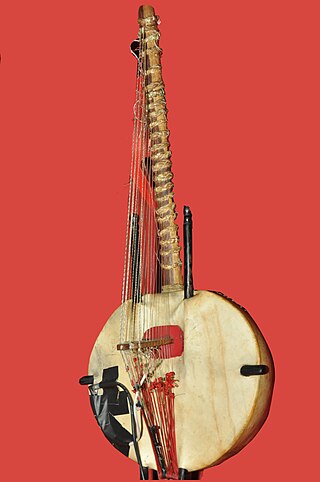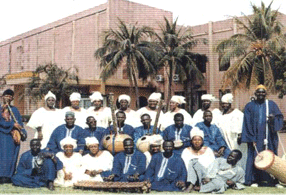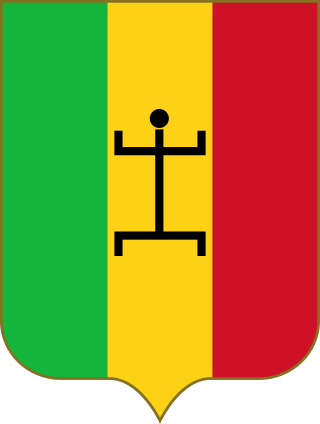Related Research Articles

The kora is a stringed instrument used extensively in West Africa. A kora typically has 21 strings, which are played by plucking with the fingers. It has features of the lute and harp.

"Flower of Scotland" is a Scottish patriotic song commonly used as an unofficial national anthem of Scotland. Written sometime in the mid-1960s by folk musician Roy Williamson, its lyrics describe the victory of Robert the Bruce, King of Scots, over Edward II, King of England, at the Battle of Bannockburn in 1314. Owing to its historical basis in the Wars of Scottish independence, the song urges contemporary Scots to rise again as an independent nation and remember the day their ancestors deterred Edward's English invaders. Notable for its association with supporters of the Scottish national football team and Scottish national rugby union team, "Flower of Scotland" is one of the most popular sporting anthems in Europe.

The balafon is a gourd-resonated xylophone, a type of struck idiophone. It is closely associated with the neighbouring Mandé, Bwaba Bobo, Senoufo and Gur peoples of West Africa, particularly the Guinean branch of the Mandinka ethnic group, but is now found across West Africa from Guinea, Burkina Faso, Mali. Its common name, balafon, is likely a European coinage combining its Mandinka name ߓߟߊ bala with the word ߝߐ߲ fôn 'to speak' or the Greek root phono.

Senegal's music is best known abroad due to the popularity of mbalax, a development of conservative music from different ethnic groups and sabar drumming popularized internationally by Youssou N'Dour.

The music of Mali is, like that of most West African nations, ethnically diverse, but one influence predominates: that of the ancient Mali Empire of the Mandinka. Mande people make up around 50% of Mali's population; other ethnic groups include the Fula (17%), Gur-speakers 12%, Songhai people (6%), Tuareg and Moors (10%).
"La Renaissance" is the national anthem of the Central African Republic. It was adopted on 25 May 1960, shortly before the republic's independence on 13 August the same year. The words were written by then Prime Minister Barthélémy Boganda. The music was composed by French composer Herbert Pepper, who also composed the national anthem of Senegal, "Le Lion rouge". The song was also the national anthem during the Central African Empire (1976–1979).

"L'Abidjanaise" is the national anthem of Côte d'Ivoire, adopted under law number 60–207 on 27 July 1960. It takes the form of a lyric and very patriotic poem, invoking inspiring imagery expressing the greatness of the Ivorian soil and values such as hope, peace, dignity, and the "true brotherhood".
"For The Gambia Our Homeland" is the national anthem of the Gambia. National anthem of the Gambia, written by Virginia Julia Howe and composed by Jeremy Frederic Howe, adopted after an international competition before independence in 1965

The music of Burkina Faso includes the folk music of 60 different ethnic groups. The Mossi people, centrally located around the capital, Ouagadougou, account for 40% of the population while, to the south, Gurunsi, Gurma, Dagaaba and Lobi populations, speaking Gur languages closely related to the Mossi language, extend into the coastal states. In the north and east the Fulani of the Sahel preponderate, while in the south and west the Mande languages are common; Samo, Bissa, Bobo, Senufo and Marka. Burkinabé traditional music has continued to thrive and musical output remains quite diverse. Popular music is mostly in French: Burkina Faso has yet to produce a major pan-African success.

Guinea is a West African nation, composed of several ethnic groups. Among its most widely known musicians is Mory Kanté - 10 Cola Nuts saw major mainstream success in both Guinea and Mali while "Yeke Yeke", a single from Mory Kanté à Paris, was a European success in 1988.

Baaba Maal is a Senegalese singer and guitarist born in Podor, on the Senegal River. In addition to acoustic guitar, he also plays percussion. He has released several albums, both for independent and major labels. In July 2003, he was made a UNDP Youth Emissary.

The music of the Gambia is closely linked musically with that of its neighbor, Senegal, which surrounds its inland frontiers completely. Among its prominent musicians is Foday Musa Suso. Mbalax is a widely known popular dance music of the Gambia and neighbouring Senegal. It fuses popular Western music and dance, with sabar, the traditional drumming and dance music of the Wolof and Serer people.

"Let Us All Unite and Celebrate Together" is the anthem of the African Union (AU). It was written as a poem titled "Proud to be African" by Ethiopian poet Tsegaye Gabre-Medhin, while the music was composed by Kenyan choral composer Arthur Mudogo Kemoli. It had served as the anthem of the former Organisation of African Unity since 1986 before being adopted by the newly formed Union in 2002.

The music of West Africa has a significant history, and its varied sounds reflect the wide range of influences from the area's regions and historical periods.
Djeli Moussa Diawara, born 1962 in Kankan, Guinea, is a Kora player (Korafola), composer and singer.
African Journey: A Search for the Roots is a blues album by an American historian Samuel Charters and an attempt to trace the roots and influences of American blues from the 1920s and 1930s back to the tribal music of West Africa. He draws connections and similarities through song content and instrument type and usage. In 1974 he traveled the length of the crescent from Senegal to Nigeria. He then returned to travel up the Gambia River to a slave pen at Jang Jang Bure. His travel path emulated the paths of slave traders. All the musical performances were recorded by means of a tape recorder. The album was released as a double vinyl set. Volume One contains songs performed by historians as well as celebratory songs from The Gambia, Senegal, and Mali. Volume Two consists of funeral processions, dances, and songs from Ghana, Togo and The Gambia.
Mamadou Sidiki Diabaté is a prominent Mandé kora player and jeli from Bamako, Mali. He is the 71st generation of kora players in his family and a son to Sidiki Diabaté.

Kora Jazz Trio is a three piece African musical group, founded in 2002 by Djeli Moussa Diawara, Guinean Korafola, with Abdoulaye Diabate and Moussa Sissokho, best known for producing a music that is a mix of American jazz with traditional African music. Described as "the encounter between mandinga musical tradition and the freedom of jazz, between West African percussion and Afro-American swing", they have been recognized for their focus on sharing their cultural heritage, without doing so for the sake of mainstream success or in an effort to create a movement.

Tasana Camara is a balafon, djembe, and kora player hailing from Conakry, Guinea in West Africa.

The National Anthem of the Mali Federation is a former national anthem that was created per the Federation's Official Law of 18 June 1960. It uses the music of the current national anthem of Mali composed by Banzumana Sissoko, and its lyrics are a slightly modified version of those of the national anthem of Senegal written by Léopold Sédar Senghor. After separation of the two countries, Mali kept the music and Senegal retained the lyrics of the Federation, albeit removing the name "Mali" among other minor changes.
References
- ↑ "Symbolique nationale". Gouvernement du Sénégal. Archived from the original on 2019-02-04. Retrieved 2021-11-30.
